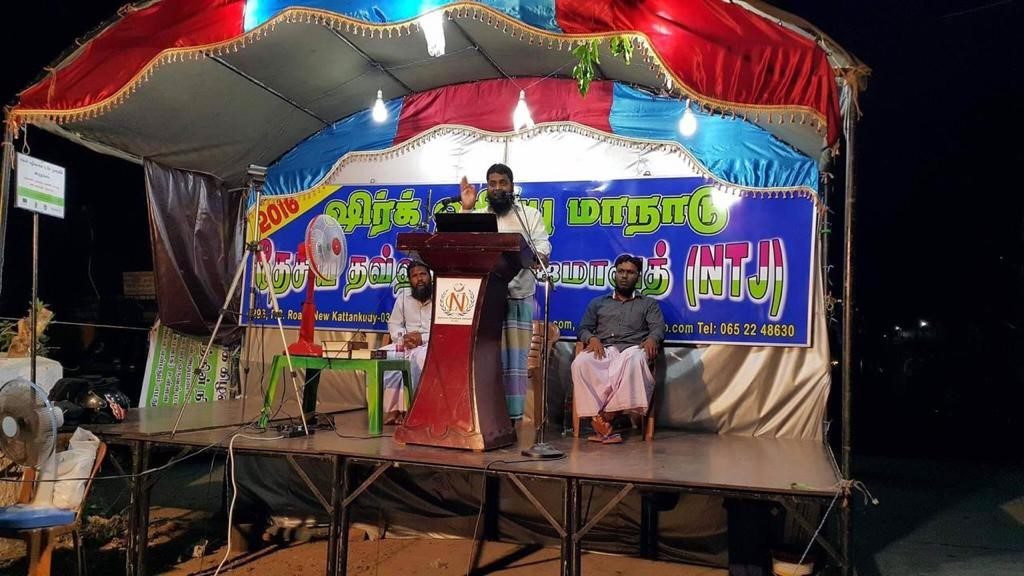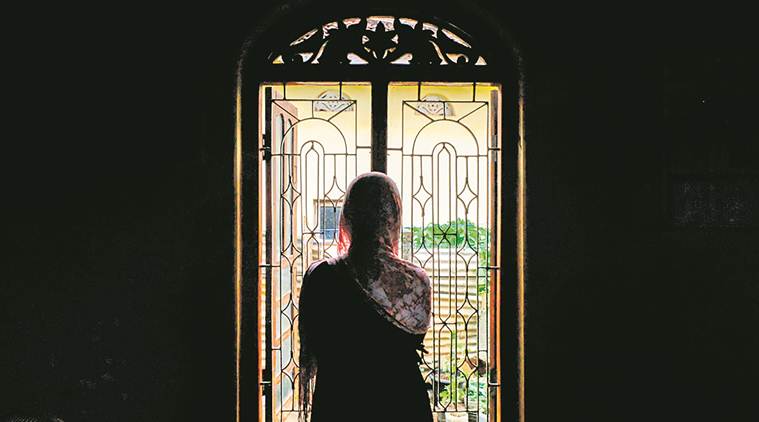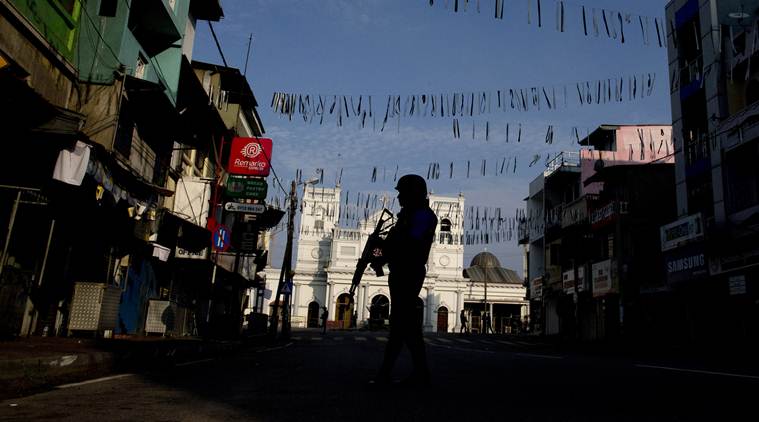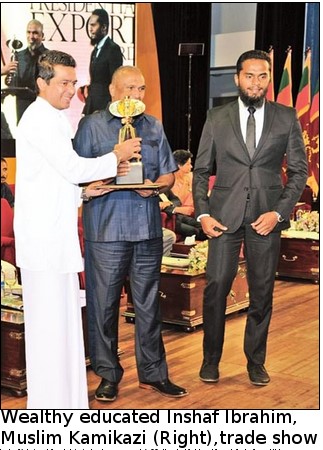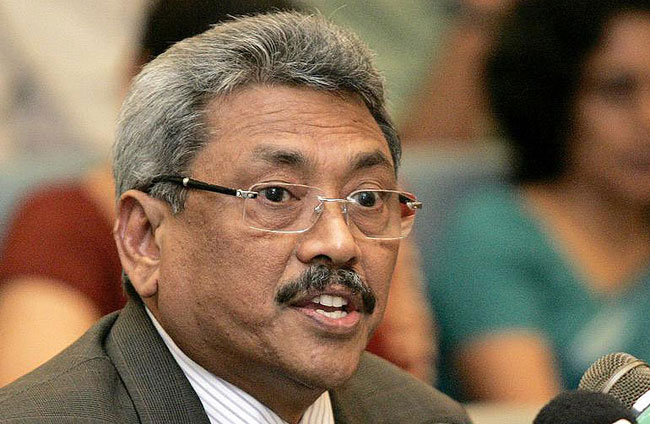Dr. Daya Hewapathirane
There are ample historic records which describe vividly the atrocities
committed by Muslims against millions of Buddhists in several countries. Their
criminality has not subsided despite their living among other religions in
different countries. Buddhists have been the most victimized and harassed
religious community in the world, owing to actions of Muslims guided by their
theistic traditions and beliefs. Buddhists cannot consider Islam as a religion
of compassion and peace. Those professing Islam have been the biggest enemies
of Buddhists and Buddhism throughout history. Before the onslaught of
Islam, Buddhism was the religion of almost the whole of Asia – ancient
countries/regions such as Bactria, Parthia, Afghanistan, Gandhar, Chinese
Turkestan, along with Tibet and Inner Mongolia were Buddhist nations that
formed almost the whole of the Asian continent. Buddhism was the dominant
religion of the people of this vast area of the Asian continent. Islam
destroyed and eliminated Buddhism from almost all these countries.
As far back as in the 10th century, as a result of the
Muslim invasion of what is modern day Afghanistan, Pakistan and India, the
Buddhist religion which formed the basis of life of the people of this part of
the world, was viciously wiped out in an act of virtual genocide. Muslim terror
and atrocities have inflicted severe damage to Buddhism in many Asian
countries, some of which were exclusively Buddhist at one stage in their
histories. In some Asian countries indigenous Buddhist spiritual traditions
have been severely weakened by decades of persecution. It is a well-known fact
that Buddhism disappeared from India under the sword of Islam. Dr. B.R.
Ambedkar, the great Indian Buddhist leader said that there is absolutely no
doubt that the fall of Buddhism in India was due to the invasions of the
Musalmans or the adherents of Islam. For about five hundred years, from the 13th
to 17th centuries, most parts of South Asia especially the Indian
subcontinent was under Muslim rule. During this period, over 50 million
Buddhists and Hindus were massacred by Islamists in greater India which in the
past included the present India, Pakistan, Bangladesh and Afghanistan.
The destruction of the colossal Afghan Bahmian Buddha
statues by fanatic Muslims, is not the first destruction resulting from Muslim
fundamentalism. In the 12th century, Nalanda, the world’s first
university, an illustrious Buddhist university located near ancient Rajagaha in
Bihar, established in the 5th century, was demolished by Muslim
fanatics. It flourished for seven centuries as one of the greatest centres of
learning in the ancient world, attracting scholars from distant countries
including China. Muslims burnt down its priceless library and mercilessly
killed its scholars including Buddhist scholar monks. Islam destroyed Buddhist
sites not only in India but wherever it went. Those conversant with global
affairs, are aware of the fact that, especially in recent years, Muslims have
become a curse to humanity, resorting to violent and unethical means of serving
their religious ends, or to ‘resolve’ their obsessive religion-based issues and
self-created problems. Peace and harmony in many countries in the East
and West have been impaired greatly owing to unwholesome actions of Muslim
religious fanatics. In recent decades Muslim extremism and violence against
Buddhists were well evident in Myanmar, Southern Thailand and Bangladesh.
During the last few decades, Muslims have gained increased strength in
Sri Lanka increased economic power largely owing to favorable opportunities and
privileges made available to them, including local political patronage. In
recent decades, all prominent political leaders of Sri Lanka, have offered them
undue patronage and privileges especially in view of expanding their vote-base,
and to serve their political self-interests.
Madrasas
In recent decades, Muslims of Sri Lanka have received increased tangible
and moral support from Muslim Middle Eastern countries to promote Islamic
religious ideology in Sri Lanka. This led to the establishment of the so-called
madrasas, initially in predominantly Muslim areas and later elsewhere in the
country. Madrasas are exclusively Muslim schools funded by Muslim countries, Saudi
Arabia in particular, to promote fundamentals of Islam, Islamic Sharia law and
the Wahhabi form of Islam. Madrasas as educational institutions are said to offer instructions in
Islamic subjects including but not limited to the Quran. It also includes Jurisprudence
or figh” and Muslim law or Sharia Law and the teaching and practice of sufi”
which encompasses Islamic mysticism. If Muslim Sharia law is given official
recognition by means of registering Madrasas as NGOs, it can result in serious
legal problems in the future. There can be only one law in our country and that
is a secular law which is applicable to all citizens irrespective of their
ethnicity or religious affiliations. There is no need to introduce any other
law, especially religious law such as Muslim Sharia Law, and cause problems in
our country. It is known that Muslim Madrasas work in collaboration
with other foreign Muslim organizations and Madrasas in providing vocational
training for Muslim youth.
In these madrasas, the younger generation of Muslims are being
brainwashed with extremist Islamic fundamentalism. It is reported that Madrasas provide Islamic extremism and militancy and are a
recruiting ground for terrorism. It is widely reported that some Taliban and Al
Qaeda leaders have obtained radical political views at Madrasas. Some
Madrasas are recorded to be promoting a militant form of Islam and teach and
train Muslim students to fight non-believers and stand against the moral
standards of non-Muslim societies. The suicide bombers involved in the July
2005 London terror attack are said to have spent time in Pakistani
Madrasas. The so-called fundamentals of
‘Islam’ that are widely propagated in madrasas have serious negative
implications as far as the national culture and the rule of law of the country
are concerned. It is noteworthy that Madrasas have been banned in
several non-Muslim countries. In recent years, Saudi
Arabia is funding the establishment of a massive Muslim university in Eastern
Sri Lanka in order to promote Islamic religious ideology.
In
some countries such as India, Pakistan, Afghanistan and Bangladesh, Muslims are
among the most deprived communities in terms of education and therefore
establishment of certain type of Madrasas for basic educational purposes has
become necessary and most people find them to be affordable as compared to
other educational institutions in these countries. This is not the case in Sri
Lanka where there is no educational deprivation or backwardness as far as the
Muslims are concerned. In fact, our school system is open to all Muslims if
they wish to attend them, and there are many Muslim students attending regular
schools in Sri Lanka. Also, there are exclusively Muslim national schools in
Sri Lanka and importantly, most international schools in the country are owned
and operated by Muslims where Muslim students predominate. This divisive spirit of Muslims is owing to the influence
of Islamic teachings to keep away from non-Muslims who are considered as inferior
to Muslims. The Koran forbids Muslims to closely associate non-Muslims. Islam
has dualistic ethics with one rule for Muslims and one rule for non-believers
and there is no exception to this rule. Why do Muslims cause disharmony and
bring about conflicts and confrontational situations in all societies they
infiltrate? Why? Buddhists need to be vigilant and need to initiate
actions against the abuse of privileges, aggression and misdemeanor by Muslims.
Their new male and female attire display their desire to look different
and to be exclusive and separate from the nation’s mainstream. This
polarization tendency of the Islamic community is self-imposed. It is not
because they feel marginalized. The so called Burqa outfit or the head covering
of Muslim women have been banned in many countries including China, France,
Belgium, Denmark, Austria, Spain, Italy, Switzerland, Turkey, Morocco, Tajikistan, Latvia, Bulgaria, Cameroon, Chad, Republic of the Congo, Gabon. the Canadian province of Quebec and
finally in Sri Lanka as well after the Muslim violence in April 2019, on Easter
Sunday.
Inciting
Violence Against Sri Lankan Buddhists
It
was not long ago that Islamic fundamentalists and armed Muslim extremists were
inciting violence against legitimate Buddhist activities in the Pottuvil
region. Muslims were forcibly encroaching upon land that rightfully belonged to
Buddhist temples on the southeast coast and demolished Buddhist archeological
sites in the East. Also, the Sri Lanka Muslims Congress and several Islamic
groups of our country had the impudence to oppose the construction of Buddha’s
statues on the island’s southeastern coastal areas which contain Buddhist
historic monuments and important archeological remains which are part of the
cultural wealth of the nation. There were protests and demonstrations by
Buddhists including many Buddhist monks, urging the Government to crack down on
anti-Buddhist activities of Muslim extremists. In a memorandum submitted to the
Buddha Sasana Ministry the protesters cited how the Islamic fundamentalists and
armed Muslim extremists were inciting violence against legitimate Buddhist
activities in the Pottuvil region. According to the Memorandum, the Muslims are
forcibly taking land that rightfully belongs to Buddhist temples on the
southeast coast.
Need
to Protect Cultural Traditions of the Nation
As a nation with a historic cultural tradition that extends to over 2200
years, where freedom, compassion, tolerance and accommodation of people of all
faiths and ethnicities have been the founding principles, it is necessary that
we as a nation take necessary steps to protect and preserve these noble and
wholesome cultural traditions. We cannot allow them to be undermined under any circumstances.
Those
deeply concerned about the need to preserve the quality and character of our
nation, built on a sound Buddhist spiritual foundation, should be deeply
grateful to patriotic organizations such as the Bodu Bala Sena among
several others countrywide, for their bold and commendable initiatives to bring
about increased awareness on the deceitful under-handed activities of extremist
Muslims to undermine the Buddhist identity of the nation and to propagate
archaic and fanatic Muslim fundamentalist customs and lifestyles in the country
that are inconsistent with and contradictory to the Buddhist norms and
principles upon which our nation is founded.
Rapid Increase of Wahhabi Influence
Sufism has been for centuries, the
predominant form of Islam in Sri Lanka. It was a peaceful form of Islam which
enabled cordial relations with people of other faiths. Wahhabi Jihadism is an
extremist, fundamentalist form of Islam followed in Saudi Arabia. Oil rich
Saudi Arabia began to influence Sri Lanka’s Sufi adherents starting in the 1970′s.
With increased funding by the Saudi Arabia with their petro dollars, and other
forms of penetration, the Wahhabi followers have increased in Sri Lanka during
recent decades. This was clearly evident in the Eastern province. Wahhabis
claim that the Sufis or the moderate Sri Lankan Muslims are ignorant of the
basic teachings and practices in Islam. They claim to be the real scholars of
Islam. This has led to sectarian clashes among peace loving Sri Lankan Muslims.
There appears to be an increasing trend in this unruly behaviour pattern of
some sections of the Muslim community, in the East and elsewhere where they
predominate. It is a fact that there is a rising trend of Wahhabi Jihadism in
Sri Lanka. Wahhabi fundamentalism has advanced so quickly in Sri Lanka partly
because the House of Saud has financed the building of many madrasas and
Mosques.
Scholarships
are offered to Muslim youths to go to Wahhabi institutions in Saudi Arabia and
Egypt with the condition that those who complete their Wahhabi studies should
return to Sri Lanka and propagate Wahhabism. This is happening extensively.
Saudi Arabia remains a critical financial support base for al-Qaida, Taliban,
Lashkar-e-Taiba and other Wahhabi terrorist groups. Saudi Arabia spends 87
billion US dollar per year to spread Wahhabism world-wide. Wahhabis are trying
to take the peaceful Islamic community in Sri Lanka down the path of extremism
and violence. The Wahhabis have already created deep divisions in among Sri Lankan
Muslims and have formed gangs that intimidate moderate Muslims who speak out
against Wahhabi fanatics. Like the Christian fundamentalist groups using NGOs
to convert innocent poor families to Christianity, Wahhabis help poor Muslim
families by providing cash and other material benefits to convert them to their
cult. Wahhabis appear to be using Sri Lankan Government agencies to propagate
Wahhabi activities.
During the last two decades, many
Sri Lankan Muslims both male and female, found employment in Saudi Arabia and
other Middle Eastern countries and were strongly influenced by Wahhabism. It is
a fact that there has been a significant increase of Wahhabi followers in Sri
Lanka in recent years and this trend is clear in the Eastern and Northwestern provinces.
Also, many young Sri Lankan Muslims were awarded scholarships by Saudi Arabia
to study Wahhabism in Saudi universities. Upon their return to Sri Lanka they
undertook in an organized manner the propagation of the ideology of Wahhabism.
They were instrumental in the establishment of numerous madrasas where young
Muslims were subject to various forms of brainwashing on Wahhabism including
the jihad approach. This Islamic fundamentalism brought about by Wahhabism
began to cause communal polarisation in Sri Lanka, like in all other southern
Asian countries. In India, the trend of increasing radicalisation of Indian
Muslims owing to Wahhabism has become a serious national security issue. The
growth of radical Islamist streams became visible only in the past two decades.
Wahhabism calls for Jihad, or war against infidels, or non-believers of
Islam
Wahhabism is a new
politico-religious movement that has been sweeping the predominantly Muslim
occupied areas of the country such as the Eastern and Northwestern provinces of
Sri Lanka. Their overall objective is to propagate the movement throughout Sri
Lanka and has raced ahead and taken control of the Jihadist and Al Fatah groups
in Sri Lanka under their wings. Through the lavish inflow of Saudi money into Sri
Lanka Wahhabis has overtaken other Islamic organizations by threats,
intimidation, and coercion. Wahhabism has been encroaching Sri Lanka without
any form of resistance from the governments of the day. Operating through a
movement called Thawheed hugely funded by Saudi Arabian sources, and through
NGOs such as Al Haj Adul Jawad Alim Valiyullah Trust, Wahhabis established
itself fully in Sri Lanka. They have established many new mosques and
madrasas” in many locations’ Sri Lanka. Saudi agents have successfully
penetrated Sri Lankan Muslims social fabric and have managed to defeat the
Sufism in their game. Due to the training afforded by the House of Saud now the
Wahhabis have prevailed over the Sufis. The Muslims in Sri Lanka have been
subdued due to the Wahhabi influence while Buddhists have been agitating for
the release of Rizana Naffek – teenage housemaid from Muthur who was sentenced
to death by a Wahhabi Sharia Court in Saudi Arabia.
Wahhabism in Sri Lanka is
headquartered in Kattankudi is a new politico-religious movement that is
sweeping the Eastern province of Sri Lanka with more than sixty Muslim Wahhabi
organizations helping in propagating the movement throughout Sri Lanka and has
raced ahead and taken control of the Jihadist and Al Fatah groups in Sri Lanka
under their wings. Wahhabism is imported and planted in the midst of
peace-loving Muslims in Sri Lanka, mostly through the lavish inflow of Saudi
money pumped into Sri Lanka has overtaken other Islamic organizations by
threats, intimidation and coercion. Clashes between Sufis and Wahhabi Muslims
in Kattankudi and Oddamavadi have been regular occurrence in the past few
decades. Many homes of Sufi followers were burnt down by Wahhabi Jihadists in
Kattankudi during similar clashes occurred in October 2004. In Kattankudi, the
hatred between Wahhabis and Sufis has widened in the last few years and has
grown in intensity, left many injured, and caused damage to several houses and
vehicles.
All the ‘Islamist’ terror attacks
in South Asia including in Mumbai, Afghanistan and Pakistan had the hallmarks
of Wahhabism. Wahhabi Jihadists are blinded by faith to believe that they have
the mandate of Allah to rid the world of ‘infidels’ and ‘heretics. Until this
Wahhabism is thoroughly discredited, combating Wahhabi terrorism is impossible.
Since the Western countries subterfuge to destabilise Sri Lanka, by
surreptitiously supporting the LTTE failed, now the Western countries will
promote Wahhabi Jihadism to cause strife and trouble to destabilize Sri Lanka.
Wahhabi followers – al-Qaida, Taliban, Lashkar-e-Taiba and other Wahhabi
terrorist groups – have caused untold misery in several countries including
Iraq, Afghanistan, Pakistan and India. Sri Lanka appears to be their next
target. The Sri Lankan government must take immediate strict measures to
control Wahhabi organizations and ban them. Wahhabis have already built several
illegal Mosques in Sri Lanka using Saudi Arabia’s petro dollar. The
overwhelming peace loving, tolerant and intensely patriotic Muslims of Sri
Lanka would extend their support to the government in this matter. As the
Wahhabis are even capable of starting ethnic riots between the peaceful Sinhala
people and the Muslims, the Sri Lankan government must not be lethargic on this
matter. The Government authorities must investigate every Wahhabi school and
propagandist in the Eastern Province to make sure they are not preaching things
that are inimical to Sri Lanka. Saudi Arabia remains a critical financial
support base for al-Qaida, Taliban, Lashkar-e-Taiba and other Wahhabi terrorist
groups. Saudi Arabia spends 87 billion US dollar per year to spread Wahhabism
world-wide. Wahhabis have infiltrated Sri Lanka Broadcasting Corporation
(SLBC). Almost all the participants and staffers in the Muslim section of Sri
Lanka Broadcasting Corporation are Wahabis and use the State radio to propagate
Wahhabism. Not only Wahhabis run private unlicensed radio stations in the
Eastern Province, also armed Wahhabis often attack mosques and leaders of the
Sufi sect.
Dr. Daya
Hewapathirane
